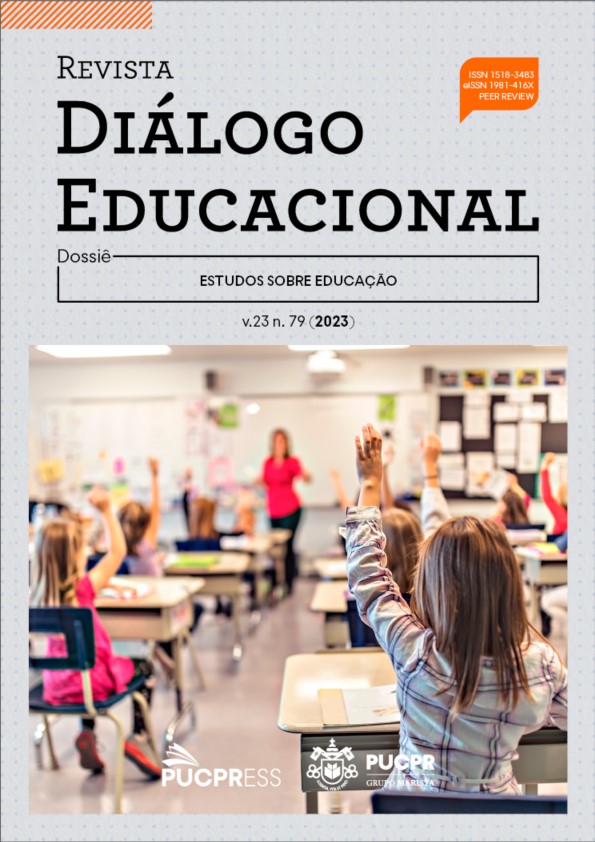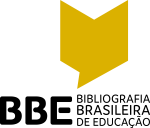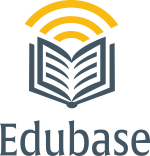A Framework of Students’ Regulation Processes for Flipped Learning
DOI:
https://doi.org/10.7213/1981-416X.23.079.AO09Resumo
A fim de alcançar o sucesso em tarefas individuais e colaborativas de aprendizagem invertida, os alunos podem se envolver em processos regulatórios produtivos para gerenciar cognições, comportamentos, emoções e contexto. As estruturas de aprendizagem autorreguladas tornaram-se a pedra angular para examinar as formas sociais de regulação. Apesar dos avanços recentes na área de corregulação, ainda são necessárias mais pesquisas sobre como grupos de alunos regulam sua aprendizagem em ambientes colaborativos. Neste trabalho aplicamos um método exploratório e integrativo para elaborar um quadro de processos regulatórios e uma avaliação por especialistas para validá-lo. Redesenhamos a estrutura de autorregulação de Pintrich, colocando uma ênfase especial no papel crucial do trabalho em grupo na aprendizagem invertida, fornecendo uma visão mais holística dos processos regulatórios. Sete especialistas em aprendizagem colaborativa responderam positivamente a um questionário para avaliar a qualidade do framework quanto à clareza, compatibilidade, produtividade, papel tecnológico, abrangência e foco no aluno. A estrutura estendida aqui apresentada tem implicações para a prática, sendo especialmente benéfica na criação de estratégias para facilitar a autorregulação e corregulação dos alunos. Este estudo fornece informações valiosas para educadores sobre design instrucional e seleção de processos regulatórios apropriados para moldar atividades de aprendizagem para facilitar o envolvimento dos alunos na abordagem de aprendizagem invertida.
Downloads
Referências
HOULT, R.; PEEL, M.; DUFFIELD, C. Lessons from Flipping Subjects in Engineering: Effectiveness of Student Learning in a Flipped Environment at the University Level. J. Civ. Eng. Educ., v. 147, n. 1, p. 1-14, 2021. DOI: https://doi.org/10.1061/(ASCE)EI.2643-9115.0000028
DOO, M.; CURTIS, J. B.; CHANG, H.; BEO-DLE W. Structural relationships among self-regulation, transactional distance, and learning engagement in a large university class using flipped learning. Asia Pacific Journal of Education, 2020. DOI: https://doi.org/10.1080/02188791.2020.1832020.
VAN ALTEN, D.; PHIELIX, C.; JANSSEN, J.; AND KESTER, L. Self-regulated learning support in flipped learning videos enhances learning outcomes. Computers and Education, v. 158, p. 1-16, 2021. DOI: https://doi.org/10.1016/j.compedu.2020.104000
BLAU, I., AND SHAMIR-INBAL, T. Re-designed flipped learning model in an academic course: The role of co-creation and co-regulation. Computers and Education, v. 115, p. 69-81, 2017. https://doi.org/10.1016/j.compedu.2017.07.014
HYPPÖNEN, L.; HIRSTO, L.; SOINTU, E. Perspectives on university students’ self-regulated learning, task-avoidance, time management and achievement in a flipped classroom context. International Journal of Learning, Teaching and Educational Research, v. 18, n. 13, p. 87-106, 2019. DOI: https://doi.org/10.26803/ijlter.18.13.5.
CHEN, H.; CHANG, C. Integrating the SOP2 Model into the Flipped Classroom to Foster Cognitive Presence and Learning Achievements. Educational Technology and Society, v. 20, n. 1, p. 274–291, 2017.
GARRISON, R.; ARBAUGH, B. Researching the community of inquiry framework: Review, issues, and future directions. Internet and Higher Education, v. 10, p. 157–172, 2007.
DURMAZ, R. Master’s Thesis Quality Evaluation of the Flipped Classroom Teaching Method in International Higher Education. Technische Universitat Munchen, TUM School of Education, 2020.
MUIJS, D.; BOKHOVE, C. Metacognition and Self-Regulation: Evidence Review. London: Education Endowment Foundation, 2020. Available at: https://educationendowmentfoundation.org.
ZHENG, B.; WARD, A.; STANULIS, R. Self-regulated learning in a competency-based and flipped learning environment: learning strategies across achievement levels and years. Medical Education Online, v. 25, n. 1, 1686949, 2020. DOI: https://doi.org/10.1080/10872981.2019.1686949.
MACMAHON, S.; LEGGETT, J.; ANNEMAREE, C. Promoting individual and group regulation through social connection: strategies for remote learning. Information and Learning Sciences, 353-363, 2020.
PINTRICH, P. The Role of Goal Orientation in Self-Regulated Learning. The University of Michigan: Ann Arbor, Michigan, 2000.
HADWIN, A.; JARVELA, S.; MILLER, M. Self-regulation, co-regulation, and shared regulation in collaborative learning environments. In: SCHUNK D.; GREENE, J. (Eds.). Handbook of self-regulation of learning and performance. 2nd ed. New York, NY: Routledge, 2018.
LOBCZOWSKI, N.; ALLEN, E. M.; FIRETTO, C. M.; GREENE, J. A.; MURPHY, P. K. An exploration of social regulation of learning during scientific argumentation discourse. Contemporary Educational Psychology, v. 63, p. 1-17. DOI: https://doi.org/10.1016/j.cedpsych.2020.101925
Andrade, H.; Brookhart, S. Classroom assessment as the co-regulation of learning. Assessment in Education: Principles. Policy and Practice, v. 27, p. 4, p. 350-372, 2020. DOI: https://doi.org/10.1080/0969594X.2019.1571992.
CHEN, P.; BONNER, S. A framework for classroom assessment, learning, and self-regulation. Assessment in Education: Principles, Policy and Practice, p. 373-393, 2019. https://doi.org/10.1080/0969594X.2019.1619515
HWANG, G.; WANG, S.; LAI, C. Effects of a social regulation-based online learning framework on students' learning achievements and behaviors in mathematics. Computers and Education, v. 160, p. 1-19, 2021. DOI: https://doi.org/10.1016/j.compedu.2020.104031
JARVELA, S.; HADWIN, A. New frontiers: Regulating learning in CSCL. Educational Psychologist, v. 48, n. 1, p. 25–39, 2013. DOI: https://doi.org/10.1080/00461520.2012.748006.
JARVELA, S.; JARVENOJA, H. Socially Constructed Self-Regulated Learning and Motivation Regulation in Collaborative Learning Groups. Teachers College Record, 2011.
GIBBONS, A.; BUNDERSON, V. Explore, explain, design. In: LEONDARD, K. K. (Ed.). Encyclopedia of Social Measurement. New York, NY: Elsevier, 2005. pp. 927–938.
KIMMONS, R.; GRAHAM, C. R.; WEST, R. E. The picrat model for technology integration in teacher preparation. Contemporary Issues in Technology and Teacher Education, v. 20, p. 1, p. 176–198, 2020.
GUNAWARDENA, C.; ZITTLE, F. Social presence as a predictor of satisfaction within a computer mediated conferencing environment. American Journal of Distance Education, 1997.
THOMPSON, T.; MACDONALD, C. Community building, emergent design and expecting the unexpected: Creating a quality eLearning experience. The Internet and Higher Education, 2005.
NEWMAN, D. R.; WEBB, B.; COCHRANE, C. A content analysis method to measure critical thinking in face-to-face and computer supported group, 2004. Retrieved from: http://www.umsl.edu/~wilmarthp/mrpc-web-resources/CA-analysis-method-to-measure-thinking-in-f2f.pdf. 13 Jan 2021.
ULLMANN, M. Formação de Grupos em Moocs Utilizando Particle Swarm Optimization. Master Dissertation. Informatics Institute, Federal University of Goiás, 2016.
ZHENG, B.; WARD, A.; STANULIS, R. Self-regulated learning in a competency-based and flipped learning environment: learning strategies across achievement levels and years. Medical Education Online, v. 25, n. 1, 1686949, 2020. DOI: https://doi.org/10.1080/10872981.2019.1686949.
GIGLER, B.-S.; BAILUR, S. Closing the Feedback Loop- Can Technology Bridge the Accountability Gap? Willey, 2014.
NOROOZI, O.; WEINBERGER, A.; BIEMANS, H.; MULDER, M. CHIZARI, M. Facilitating argumentative knowledge construction through a transactive discussion script in CSCL. Computers and Education, v. 61, 2013.
ISOHATALA, J.; NAYKKI, P.; JARVELA, S. Cognitive and Socio-Emotional Interaction in Collaborative Learning: Exploring Fluctuations in Students Participation. Scandinavian Journal of Educational Research, v. 64, n. 6, p. 831-851, 2013. DOI: https://doi.org/10.1080/00313831.2019.1623310.
AMANPREET, K. App Review: Trello. University of Pennsylvania: Penn Libraries, 2018.
LI, Y.; LI, X.; SU, Y.; PENG, Y.; HU, H. Exploring the role of EFL learners’ online self‐regulation profiles in their social regulation of learning in wiki‐supported collaborative reading activities. J. Comput. Educ., v. 7, p. 575–595, 2020. DOI: https://doi.org/10.1007/s40692-020-00168-3.
TEASLEY, S.; ROSCHELLE, J. The construction of shared knowledge in collaborative problem solving. In: LAJOIE, S.; DERRY, S. (Eds.). Computers as cognitive tools. Hillsdale, NJ: Erlbaum, 1993. p. 229-258.
AGRICOLA, B.; PRINS, F. J.; VAN DER SCHAAF, M. F.; VAN TARTWIJK, J. Shifting Patterns in Co-regulation, Feedback Perception, and Motivation During Research Supervision Meetings. Scandinavian Journal of Educational Research,
v. 64, 1030-1051, 2020. https://doi.org/10.1080/00313831.2019.1640283
DEWEY, J.; BENTLEY, A. Knowing and the Known. Beacon Press: Boston, 1949.
GUILFORD, J. Creativity. American Psychologist, v. 5, p. 444–454, 1950.
KAPLAN, J.; DE MONTALEMBERT, M.; LAURENT, P.; FENOUILLET, F. ERICA an instrument to measure individual and collective regulation of learning. Revue Europeenne de Psychologie Appliquee/European Review of Applied Psychology, v. 67, n. 2, p. 79–89, 2017. DOI: https://doi.org/10.1016/j.erap.2017.01.001.
WEBSTER, E. Regulating Emotions in Computer-Supported Collaborative Problem-Solving Tasks. A Dissertation Submitted in Partial Fulfillment of the Requirements for the Degree of Doctor of Philosophy in the Department of Educational Psychology and Leadership Studies, 2020.
Downloads
Publicado
Como Citar
Edição
Seção
Licença
Copyright (c) 2023 Editora Universitária Champagnat

Este trabalho está licenciado sob uma licença Creative Commons Attribution 4.0 International License.
O(s) autor(es) transfere(m), por meio de cessão, à EDITORA UNIVERSITÁRIA CHAMPAGNAT, pessoa jurídica de direito privado, inscrita no CNPJ/MF sob o n.º 76.659.820/0009-09, estabelecida na Rua Imaculada Conceição, n.º 1155, Prado Velho, CEP 80.215-901, na cidade de Curitiba/PR, os direitos abaixo especificados e se compromete a cumprir o que segue:
- Os autores afirmam que a obra/material é de sua autoria e assumem integral responsabilidade diante de terceiros, quer de natureza moral ou patrimonial, em razão de seu conteúdo, declarando, desde já, que a obra/material a ser entregue é original e não infringe quaisquer direitos de propriedade intelectual de terceiros.
- Os autores concordam em ceder de forma plena, total e definitiva os direitos patrimoniais da obra/material à EDITORA UNIVERSITÁRIA CHAMPAGNAT, a título gratuito e em caráter de exclusividade.
- A CESSIONÁRIA empregará a obra/material da forma como melhor lhe convier, de forma impressa e/ou on line, inclusive no site do periódico da EDITORA UNIVERSITÁRIA CHAMPAGNAT, podendo utilizar, fruir e dispor do mesmo, no todo ou em parte, para:
- Autorizar sua utilização por terceiros, como parte integrante de outras obras.
- Editar, gravar e imprimir, quantas vezes forem necessárias.
- Reproduzir em quantidades que julgar necessária, de forma tangível e intangível.
- Adaptar, modificar, condensar, resumir, reduzir, compilar, ampliar, alterar, mixar com outros conteúdos, incluir imagens, gráficos, objetos digitais, infográficos e hyperlinks, ilustrar, diagramar, fracionar, atualizar e realizar quaisquer outras transformações, sendo necessária a participação ou autorização expressa dos autores.
- Traduzir para qualquer idioma.
- Incluir em fonograma ou produção audiovisual.
- Distribuir.
- Distribuir mediante cabo, fibra ótica, satélite, ondas ou qualquer outro sistema que permite ao usuário realizar a seleção da obra ou produção para recebê-la em tempo e lugar previamente determinados por quem formula a demanda e nos casos em que o acesso às obras ou produções se faça por qualquer sistema que importe em pagamento pelo usuário.
- Incluir e armazenar em banco de dados, físico, digital ou virtual, inclusive nuvem.
- Comunicar direta e/ou indiretamente ao público.
- Incluir em base de dados, arquivar em formato impresso, armazenar em computador, inclusive em sistema de nuvem, microfilmar e as demais formas de arquivamento do gênero;
- Comercializar, divulgar, veicular, publicar etc.
- Quaisquer outras modalidades de utilização existentes ou que venham a ser inventadas.
- Os autores concordam em conceder a cessão dos direitos da primeira publicação (ineditismo) à revista, licenciada sob a CREATIVE COMMONS ATTRIBUTION LICENSE, que permite o compartilhamento do trabalho com reconhecimento da autoria.
- Os autores autorizam a reprodução e a citação de seu trabalho em repositórios institucionais, página pessoal, trabalhos científicos, dentre outros, desde que a fonte seja citada.
- A presente cessão é válida para todo o território nacional e para o exterior.
- Este termo entra em vigor na data de sua assinatura e é firmado pelas partes em caráter irrevogável e irretratável, obrigando definitivamente as partes e seus sucessores a qualquer título.
- O não aceite do artigo, pela EDITORA UNIVERSITÁRIA CHAMPAGNAT, tornará automaticamente sem efeito a presente declaração.













